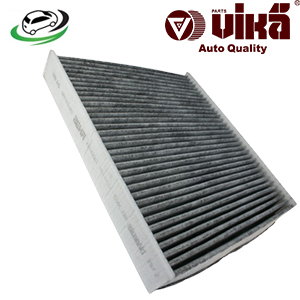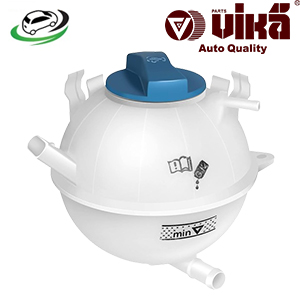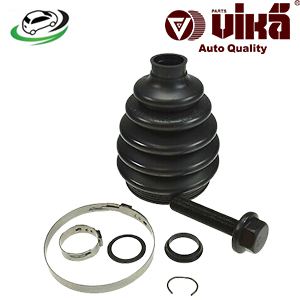-18%
Get Outer Driveshaft Boot Kit AUDI A3/S3/SPORTB./LIM./QU. 2004-2013 1K0498203
The outer driveshaft boot kit is an essential component in a vehicle’s drivetrain system, specifically associated with the driveshafts. It is designed to protect the CV (constant velocity) joint at the end of the driveshaft from contaminants and ensure smooth power transfer from the engine to the wheels. Understanding its function, types, benefits, and maintenance can help you keep your vehicle’s drivetrain in optimal condition.
Function of the Outer Driveshaft Boot Kit
- Protection of CV Joint:
- Primary Role: The outer driveshaft boot kit protects the CV joint, a crucial component that allows the driveshaft to transfer power while accommodating the up-and-down movement of the suspension.
- Mechanism: The boot, typically made of rubber or polyurethane, forms a seal around the CV joint, preventing dirt, water, and debris from entering and causing damage.
- Containment of Grease:
- Primary Role: The boot kit helps contain the grease that lubricates the CV joint.
- Mechanism: By keeping the grease inside the boot, it ensures proper lubrication of the CV joint, reducing friction and wear.
- Smooth Operation:
- Primary Role: The outer driveshaft boot kit contributes to the smooth operation of the drivetrain system.
- Mechanism: By preventing contaminants from entering and maintaining lubrication, it ensures that the CV joint functions smoothly, providing a consistent power transfer to the wheels.
- Prevention of Noise and Vibration:
- Primary Role: The boot kit helps reduce noise and vibration that can occur if the CV joint is damaged or lacks proper lubrication.
- Mechanism: By maintaining the integrity of the CV joint and its lubrication, the boot kit minimizes potential drivetrain noise and vibrations.
Types of Outer Driveshaft Boot Kits
- Rubber Boot Kits:
- Description: Made from rubber, these boot kits are the most common and cost-effective option.
- Advantages: Rubber boots are flexible, relatively inexpensive, and offer good protection against contaminants.
- Disadvantages: Rubber can degrade over time due to heat and exposure to chemicals, leading to cracking and eventual failure.
- Polyurethane Boot Kits:
- Description: Polyurethane boots are designed to be more durable and resistant to wear compared to rubber boots.
- Advantages: They offer better resistance to heat, chemicals, and abrasion, providing a longer lifespan.
- Disadvantages: Polyurethane boots can be more expensive than rubber options and may be less flexible.
- Silicone Boot Kits:
- Description: Silicone boots are designed to offer superior resistance to extreme temperatures and chemicals.
- Advantages: They provide excellent durability and longevity, especially in harsh operating conditions.
- Disadvantages: Silicone boots are generally more expensive and may be less flexible compared to rubber or polyurethane.
- Universal Boot Kits:
- Description: Universal boot kits are designed to fit a wide range of vehicles and applications.
- Advantages: They offer flexibility in terms of fitment and can be used as a replacement for various makes and models.
- Disadvantages: They may not offer the same level of precision fit and performance as vehicle-specific kits.
Benefits of Properly Installed Outer Driveshaft Boot Kits
- Enhanced CV Joint Longevity:
- Benefit: Properly installed boot kits extend the life of the CV joint by protecting it from contaminants and ensuring adequate lubrication.
- Explanation: By maintaining the cleanliness and lubrication of the CV joint, the boot kit reduces wear and tear, leading to a longer service life.
- Improved Drivetrain Performance:
- Benefit: The boot kit helps maintain smooth operation of the drivetrain, ensuring efficient power transfer from the engine to the wheels.
- Explanation: Properly functioning CV joints and driveshafts contribute to better vehicle performance and handling.
- Reduced Maintenance Costs:
- Benefit: By protecting the CV joint and avoiding premature wear, a well-maintained boot kit helps reduce the need for costly repairs or replacements.
- Explanation: Regular maintenance and timely replacement of boot kits prevent more extensive damage to the drivetrain system.
- Minimized Noise and Vibration:
- Benefit: A properly functioning boot kit helps reduce drivetrain noise and vibrations that can occur with a damaged or worn CV joint.
- Explanation: Smooth operation of the CV joint leads to a quieter and more comfortable driving experience.
- Enhanced Vehicle Safety:
- Benefit: Keeping the CV joint in good condition ensures reliable power transfer and handling, contributing to overall vehicle safety.
- Explanation: A well-maintained drivetrain system enhances vehicle stability and control, reducing the risk of accidents.
Symptoms of a Faulty Outer Driveshaft Boot Kit
- Cracks or Tears in the Boot:
- Symptom: Visible cracks, tears, or damage on the outer surface of the boot.
- Cause: Exposure to heat, chemicals, or physical damage can lead to boot deterioration.
- Consequence: Damaged boots allow contaminants to enter the CV joint, leading to premature wear and potential failure.
- Grease Leakage:
- Symptom: Grease leaking from the boot or around the CV joint area.
- Cause: A damaged or torn boot can cause the grease to escape.
- Consequence: Loss of grease leads to inadequate lubrication, resulting in increased friction and potential CV joint damage.
- Clicking or Knocking Noises:
- Symptom: Unusual clicking or knocking noises when turning or accelerating.
- Cause: Worn or damaged CV joints can produce noise due to loss of lubrication or contamination.
- Consequence: These noises indicate potential issues with the CV joint, often due to a faulty boot.
- Vibration During Driving:
- Symptom: Noticeable vibration or shuddering while driving, especially during acceleration or turning.
- Cause: A worn CV joint or imbalance in the driveshaft can cause vibrations.
- Consequence: Vibration often signals that the CV joint is not functioning correctly, which can be traced back to a damaged boot.
- Decreased Handling Performance:
- Symptom: Diminished steering response or handling performance.
- Cause: A compromised CV joint can affect drivetrain efficiency and handling.
- Consequence: Reduced handling performance can impact vehicle control and safety.
Maintenance and Replacement Tips
- Regular Inspections:
- Tip: Periodically inspect the outer driveshaft boot kit for signs of wear, damage, or leaks. Check for visible cracks, tears, or grease leakage.
- Frequency: Inspections should be part of routine vehicle maintenance, typically during oil changes or service intervals.
- Timely Replacement:
- Tip: Replace faulty or damaged outer driveshaft boot kits promptly to prevent CV joint damage and drivetrain issues.
- Indication: Replace the boot kit if there are visible signs of damage, grease leakage, or persistent drivetrain issues.
- Proper Installation:
- Tip: Ensure that the boot kit is installed correctly, with proper sealing and secure connections. Follow manufacturer instructions for installation.
- Reason: Proper installation prevents leaks and ensures effective protection for the CV joint.
- Use Quality Parts:
- Tip: Choose high-quality outer driveshaft boot kits that meet or exceed OEM specifications for your vehicle.
- Reason: Quality parts ensure reliable performance and durability, reducing the risk of future issues.
- Professional Assistance:
- Tip: Have a professional mechanic inspect and replace outer driveshaft boot kits if you are unsure about the process or if complications arise.
- Reason: Professional assistance ensures proper installation and function of the boot kit.
- Monitor Drivetrain Performance:
- Tip: Pay attention to changes in drivetrain performance or unusual symptoms as indicators of boot kit condition.
- Reason: Monitoring helps identify potential issues early and ensures timely maintenance or replacement.
- Maintain Proper Lubrication:
- Tip: Ensure that the CV joint is adequately lubricated, especially if you are replacing or servicing the boot kit.
- Reason: Proper lubrication is essential for the smooth operation and longevity of the CV joint.
Follow us on Facebook for more parts.



